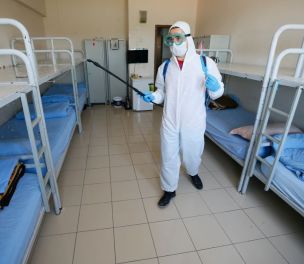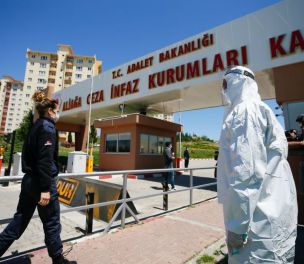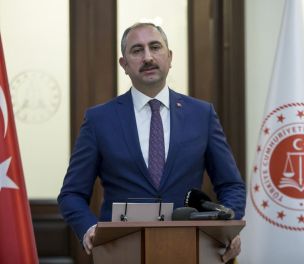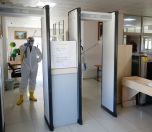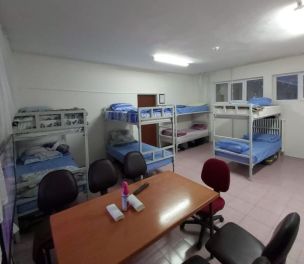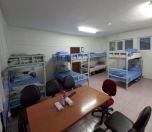* Photo: Ayça Söylemez - Silivri Prison / "Last Resort Buffet"
Click to read the article in Turkish / Kurdish
The Bakırköy Chief Public Prosecutor's Office has made a statement today (May 8) and announced that 44 prisoners tested positive for the novel coronavirus (COVID-19) in Silivri Prison in İstanbul.
According to the statement of the prosecutor's office, four of the prisoners who tested positive for the virus have been hospitalized while the others have been placed in isolation under the supervision of physicians and their families have been informed about the situation.
In another statement on April 28, it was announced that 55 people who tested positive for COVID-19 in Konya Prison were hospitalized.
Minister of Justice Abdulhamit Gül has indicated that three convicts in open prisons lost their lives during their treatment. However, except for this statement dated April 13, no detailed information has been shared with the public as to how prisoners were taken to hospitals, how they were treated and at what stage they were tested for the virus.
There are several question marks about the protection of arrestees and convicts in Silivri Prison as well as in all prisons across Turkey.
'Measures have started to turn into violations of rights'
Speaking to bianet about the issue, Berivan E. Korkut from the Civil Society in the Penal System (CİSST) Association has both listed these questions and explained what other measures need to be taken in prisons.
Korkut has underlined that the measures taken in prisons are oriented towards breaking the contact of prisoners with the outside world; however, these measures sometimes lead to violations of rights:
"There are some institutions where newspapers and letters are not given to prisoners in the name of precautions. There are also some others where fresh fruits and vegetables are not allowed into prisons. Some of the measures have started to turn into violations of rights.
"In addition, wardens try to stay away from prisoners or to not enter [the wards] for counting in order to protect them. However, there are also institutions like Kocaeli Prison where body searches are conducted. We have also read in the press that prison wards are still searched."
'Cleaning products are under the initiative of prisons'
Korkut has noted that while wards were disinfected in the first days of the outbreak, this practice has not turned into a systematic cleaning:
"There are very crowded wards and disinfection is not done regularly. Cleaning products are also under the initiative of the institutions. These measures are neither systematic nor regular, which causes problems, especially for prisoners who cannot afford cleaning supplies.
"Moreover, prison wards should have been equipped with thermometers, but it was not done. There is still a problem with lack of widespread testing, as in the case of outside prisons."
Open prisons are now empty, so is the kitchen...
Reminding us that one of the basic measures to strengthen the immune system is to eat healthy and regularly, Korkut has raised concerns that the problem with bad quality food has aggravated in this period:
"The first measure should have been to ease the crowd in wards and give better quality food; however, the quality of food has recently got worse."
Berivan Korkut has explained the reason for this as follows: "After the prisoners in open prisoners have been released, the functioning of dining halls has fallen into a crisis because these places operated on a work basis and prisoners were working there in shifts. As a large number of people have been released or given leaves following the law on criminal enforcement, this chain of work has got broken. Imagine a workplace which does not hire a new cook after the former quits the job..."
This lack of organization could have been prevented at the very beginning, Korkut has said and added, "While the law was still being debated, it was known that people would be given leaves or they would be released from prison. People could have been employed to work in the kitchen in that process. While nutrition is the most important preventive measure, it was not taken and we are now in the Ramadan month."
How are prisoners taken to hospital?
Concluding her remarks, Berivan Korkut has also asked "how the normalization will take place in prisons":
"No detailed statement has been made about this issue. For instance, will prison visitations get back to the old system? What kind of arrangements will be made in closed spaces? There are still problems in medical services such as not having a doctor at the sick room or failure to let prisoners to go to the sick room. As going to hospital requires a 14-day quarantine period after returning to prison, there are some prisoners who do not see a doctor."
Korkut has noted that, in the current situation, there are some points still awaiting an explanation and clarification: "How does the quarantine work? How will the doctor on duty at sick rooms be kept in quarantine? How were the prisoners who tested positive for the virus in Silivri Prison taken to the hospital? In an ambulance or in a shuttle bus? How are the vehicles carrying prisoners to hospitals disinfected? It would be wrong to expect all of this work from gendarmerie officers or wardens. It is not their duty. They are stressed, too. Are they given psychological support? We are waiting for a comprehensive statement about all this."
Korkut has also raised concerns that there are disruptions in the treatment of seriously ill prisoners apart from the outbreak: "Maybe they will not contract COVID-19, but the ones who have other diseases are at a bigger risk, as it is also the case outside prisons." (AS/SD)





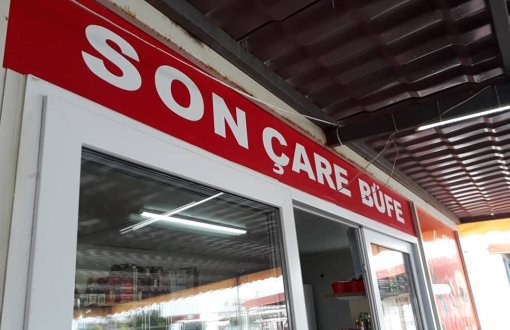
-132.jpg)
